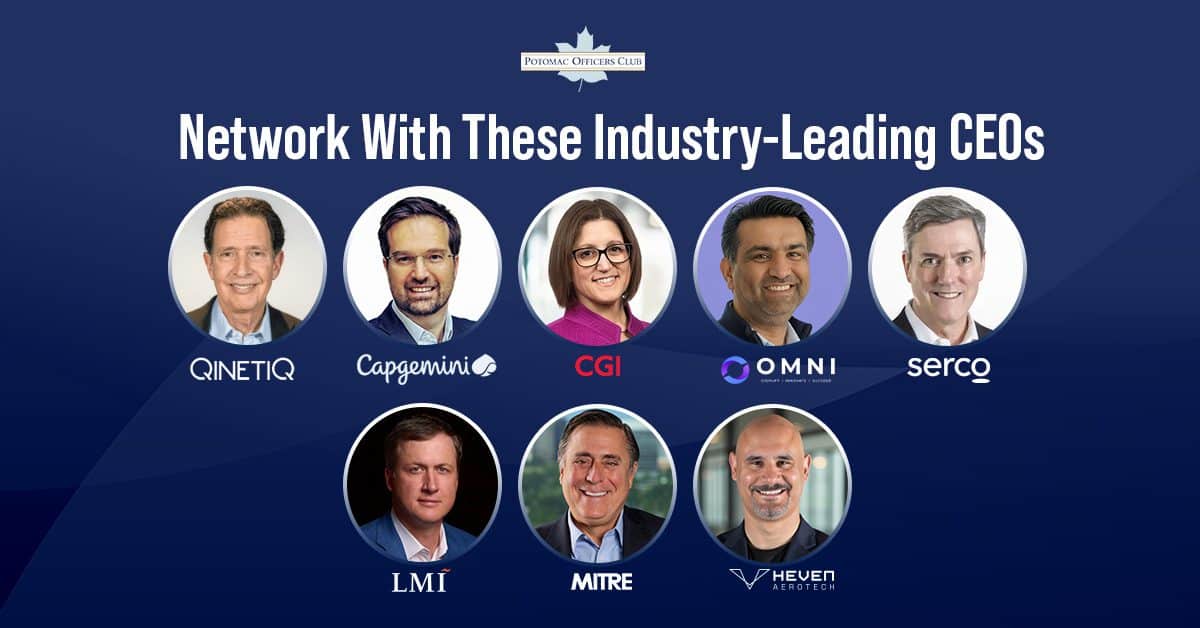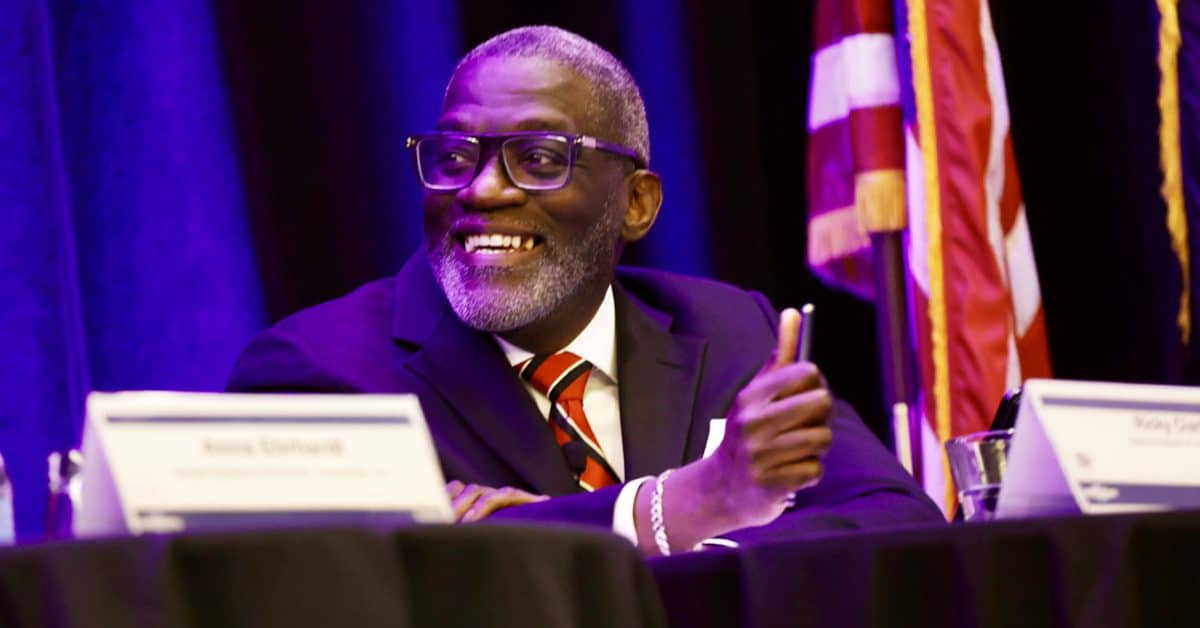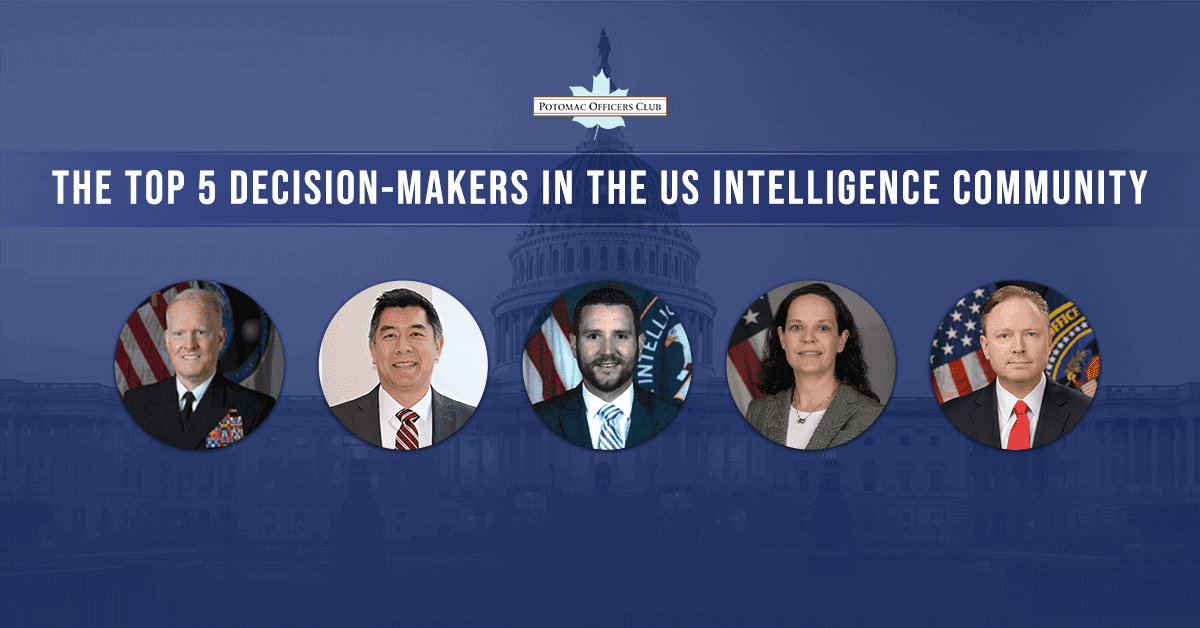
The US Intelligence Community’s Top 5 Decision-Makers
U.S. intelligence professionals have outsized influence in policy and budgets beyond their spy personas. Operating at the intersection of national security, foreign affairs and advanced technology, their careers often span decades in field operations, strategic leadership, technical innovation and policy development, giving them a deep understanding of mission priorities, operational risk and interagency coordination.
Potomac Officers Club identified five leading intelligence decision-makers for their blend of operational credibility, policy influence and technical expertise that directly shapes how the intelligence community sets priorities and spends money. They represent traditional mission leadership, enterprise IT and modernization, law-enforcement intelligence integration and emerging technologies like AI.
For GovCon executives, the best place to engage with top leaders in the intelligence community is the Potomac Officers Club’s 2025 Intel Summit this Thursday!. Dive into the latest requirements and partnership opportunities. Check out the latest offerings from leading sponsors including SAIC, SOSi and Moody’s. Secure your seat today for this essential GovCon conference for intelligence professionals and boost your intelligence revenues in FY 2026!
Discover more about these leading U.S. intelligence officials:
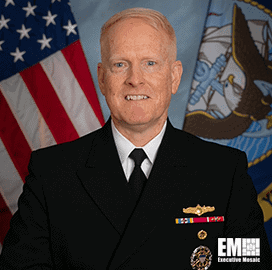
VADM Frank Whitworth
National Geospatial-Intelligence Agency
Whitworth is director of the U.S. intelligence agency that almost every government agency depends on—the National Geospatial-Intelligence Agency. NGA leverages data from various cutting-edge technologies such as mobile sensors, satellites, aerial images and ground control stations to create real-time maps. These help policymakers and military officials identify where, when and to what extent a threat could develop.
Whitworth has presided over improved intelligence collection orchestration at NGA. The agency and the Space Force in the last year created the Joint Mission Management Center. This center brings together intelligence professionals and warfighters under NGA authority to decrease gaps from collection requests to delivery while leveraging a “whole-of-GEOINT” constellation.
Learn more about how NGA is leveraging commercial technologies in its intelligence work at the 2025 Intel Summit this Thursday! Whitworth’s keynote address is a can’t-miss for GovCons with an intelligence portfolio. Buy your ticket today and be the first to learn about NGA’s spending priorities in FY 2026!
Whitworth has also prioritized contracting improvements. In a House hearing on national security space programs in May, Whitworth testified how NGA has been leading an IC-wide effort to better coordinate commercial GEOINT purchases in the federal government. The agency has been providing stakeholders with access to commercial imagery through the web-based Global Enhanced GEOINT Delivery, or G-EGD, web-based service. In 2024 alone, G-EGD provided more than 325 million unclassified images to missions across the federal government.
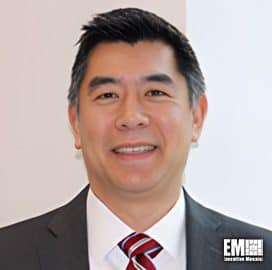
Israel Soong
CIA
Soong is the IC’s leading authority on southeast Asia and cybersecurity. As the CIA’s deputy director for the office of AI, he is responsible for orchestrating and integrating AI functions across the agency. Get actionable insights from Soong during his appearance at the “Enabling Intelligence Community Missions with AI” panel discussion at the 2025 Intel Summit this Thursday.
He is also a leading expert on China having previously served as the lead director for countering China cyber threats at the National Security Council. In a July 2024 discussion at the Hudson Institute, Soong discussed how the Five Eyes intelligence alliance between the U.S, U.K., Canada, Australia and New Zealand was an example of a successful intelligence partnership leveraging cybersecurity and technology cooperation.
Soong said intelligence agencies from the U.S., U.K., Canada and Australia in early 2024, for the first time, issued a joint mutual cybersecurity advisory about the Chinese state-sponsored cyber group known as Volt Typhoon. Soon said that the U.S. has the capacity for more joint cybersecurity advisories with intelligence agencies from other allied nations.
“Those countries are benefiting from the United States directly engaging, hardening national security networks, bolstering the security of critical infrastructure. It’s a work in progress, but it’s great work,” Soong said.
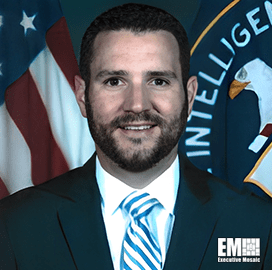
Ryon Klotz
CIA
Klotz is a leading cybersecurity executive in the IC. As the CIA’s deputy chief information officer for IT enterprise, Klotz has been leading efforts to improve the CIA’s digital security through zero trust. Take advantage of the opportunity to hear directly from Klotz during the “Acceleration of Commercial Technology into National Intelligence Missions” panel at the 2025 Intel Summit this Thursday.
Creating a common understanding of a basic maturity model for zero trust would allow the agency to better evaluate its status on the various zero trust pillars. This, he said, would help the CIA better target investments to improve cyber maturity, according to a GovCIO article. Additionally, the CIA is prioritizing using telemetry for intelligence purposes so analysis can better respond to anomalous behavior, FedTech has reported.
Klotz is not just responsible for cybersecurity at the CIA. He’s also overseeing the agency’s transition to cloud computing, including in implementation and acquisition.
Dig into the hottest emerging technologies in intelligence at the 2025 Intel Summit this Thursday! Get your pressing questions answered by leading intelligence experts during Q&A sessions. Engage in valuable conversations with other GovCon titans that only happen in person. Sign up today and ensure you’re part of the discussion!
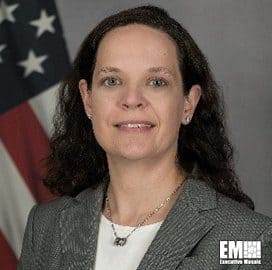
Carrie Thompson
Drug Enforcement Administration
Thompson has unique experience in the IC as she leverages her intelligence skills and experience to fight drugs. As the Drug Enforcement Administration’s chief of intelligence, Thompson uses a blended strategy of data-fueled intelligence operations to create global partnerships, facilitate information deconfliction and sharing and move intelligence tradecraft forward within law enforcement. Learn valuable insights from Thompson’s career during the “Adapting Intelligence Practices to Match Continued Engagement in a Changing World” panel discussion at the 2025 Intel Summit this Thursday.
The DEA under Thompson has created three cross-agency counter threat teams to perform a network-focused operational strategy to stop the Sinaloa and Jalisco cartels and their criminal finance networks. During a March 2024 House hearing, Thompson testified that these U.S. teams are leveraging intelligence tools and tradecraft to map, analyze and target these cartels’ criminal networks. This strategy has paid off as DEA investigations have brought charges against 28 members and associates of a Sinaloa Cartel division, including leaders, suppliers and others.
Thompson has spent 27 years with the DEA in a variety of roles. Prior to becoming the chief of intelligence in 2022, she spent four years as the executive assistant and chief of staff to the chief of intelligence. She has served in global positions including as regional intelligence manager for Europe and Asia in Belgium from 2011 to 2016 and as an intelligence analyst and targeter in Pakistan from 2004 to 2006.
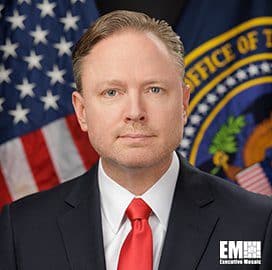
Aaron Lukas
Office of the Director of National Intelligence
Foreign affairs has defined Lukas’ 21-plus year government career. Prior to his confirmation in July as principal deputy director of national intelligence, he was a foreign service officer for over 21 years. Lukas also worked as senior director to Russia and Europe at the White House’s National Security Council during President Trump’s first term and also served overseas as a CIA operations officer. Lukas brings extensive national security experience to ODNI, serving as an intelligence aide to former acting DNI Ric Grenell in 2020.
Lukas is a well-rounded intelligence professional, with expertise in all of the IC’s core missions: conducting all-source analysis, intelligence collection and covert action. He is certified in the CIA’s most challenging operational tradecraft required to operate in a hostile counterintelligence environment. Lukas also has both training and experience in conducting high-threat meetings.
“I understand intimately the value of ground-level intelligence and how to work with collectors, targeters and analysts from multiple organizations to advance the shared mission of protecting the United States via focused, high-quality intelligence work,” Lukas said in his questionnaire for completion by presidential nominees for his Senate confirmation hearing.

Category: Articles



